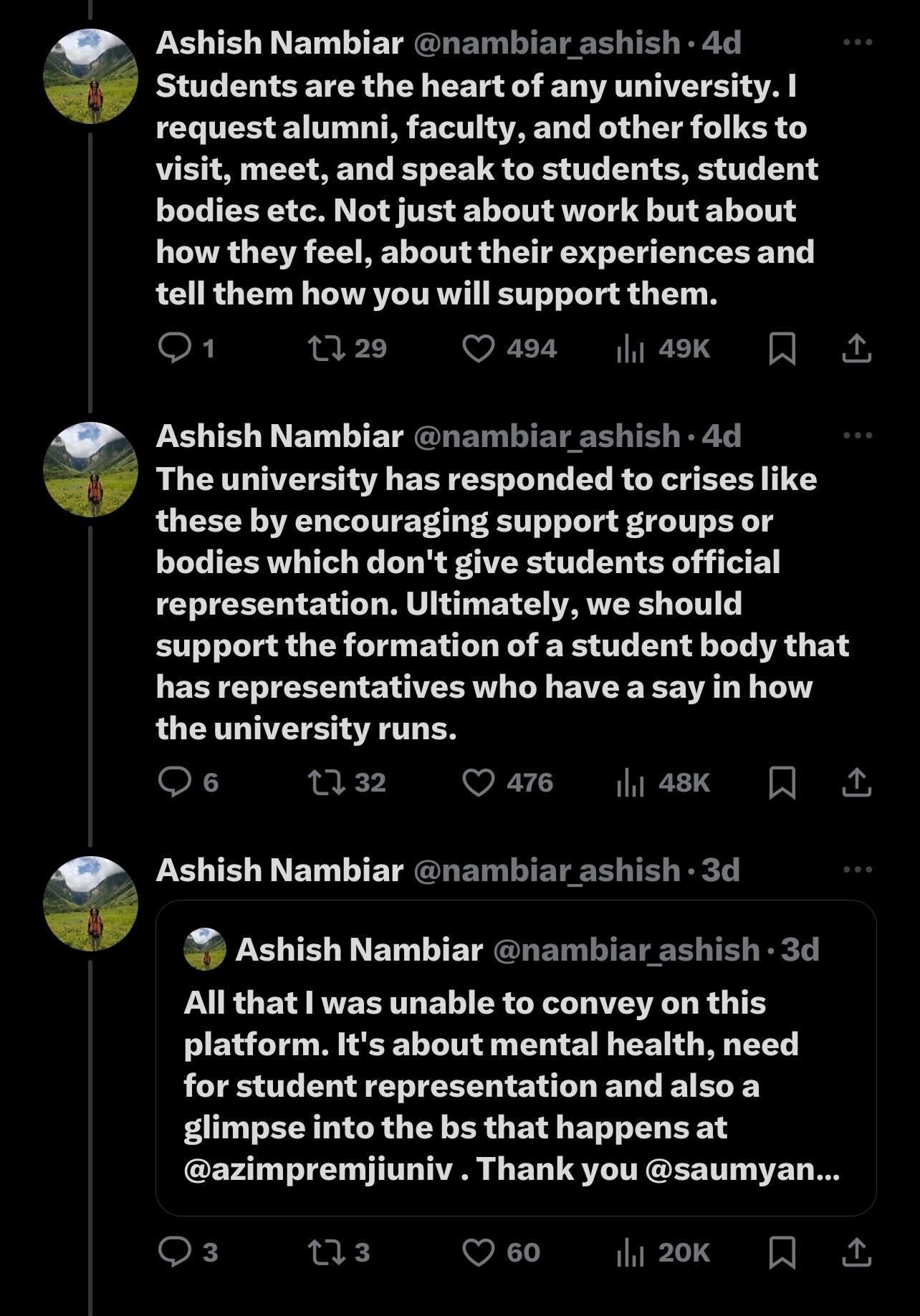TW: Mentions student suicide
Recently, a shocking incident took place in Azim Premji University Bengaluru. A B.Sc. student named Ashwin Nambiar died by suicide on the 10th of November. After the incident Ashwin Nambiar’s brother and former alumni of the university, Ashish Nambiar took to twitter to talk about it further, He tweeted saying that the university hasn’t contacted the family even after 17 days post the incident.


Ashish’s tweet thread.
On talking about what might have triggered his brother, he mentioned a recent incident where his brother was found with cigarettes in his bag and was called in by the disciplinary committee. He also emphasized on the lack of evidence indicating his brother actually smoking. There was no camera footage, nothing and as he lived in the hostel, the cigarettes could have belonged to someone else too. Ashish claims that his brother was charged guilty without any substantial evidence.
While talking to the media Ashish said , “A few weeks ago, there was an incident when a cigarette smell was wafting in the hostel’s hallway. This led the hostel staff to conduct inspections in all rooms, and cigarette packs were found among my brother’s and other student’s belongings. Even though it was not clear who was smoking, disciplinary action was launched against all of them, yet this was not informed to their families,”
He also said that his brother was struggling with clinical depression due to which he wasn’t doing great academically. Ashish said, “Ashwin was struggling academically. He was severely depressed. Add to that the action of the disciplinary committee. Of course, he crumbled,”
As per the family, even after two weeks since the incident, the university failed to reach out to them. The family had to gather all the bits and pieces of information about Ashwin’s death on their own by talking to his friends. For a grieving family, this experience was nothing short of appalling and left them devastated.
“It has been 17 days, and we have not heard anything from the university officially. It should be the institute’s responsibility to extend its condolences to the family, but the university has taken zero accountability for the incident, which is highly unacceptable and apathetic. As an alumnus, I have had a positive experience at Azim Premji University. But during my interaction with several undergraduate students at the institute, I was deeply disheartened to note that most students are facing a multitude of problems on campus,” Ashish said to the media.
Ashish also highlighted the absence of a student body in the university. He explained how it’s challenging to gauge the intensity of committee meetings since no one is present except the student. Ashish claimed that his brother was called in for a meeting by the disciplinary committee, an event he alleges triggered his brother to take the drastic step.
He said: “At Azim Premji University, one of the sad things is that no one can know what has been happening at these committee meetings. As a person already struggling with depression, Ashwin was unable to defend himself in the meeting, and he was asked not to share any details of the meeting with anyone. The family was also not contacted by the institute regarding these accusations,”
The university on the other hand, made a contrary statement saying how they’re devastated from the incident and have offered condolences to the family.
In a statement given to the media, a university spokesperson from the university said, “We are deeply distressed by the unfortunate demise of one of our students. We have extended all possible support to his family as they cope with this devastating loss. We have been engaging with family members, including working with the hospital and investigating authorities to complete all necessary procedural formalities. The University will continue to extend all assistance. Any suggestion to the contrary is regrettable.”
On the accessibility of mental health, the university’s spokesperson added, “Besides mental health support, the University has several other support mechanisms such as a dedicated academic resource center, one-on-one faculty mentor support, peer support, etc. The University has been engaging with the students on their demands and suggestions. Several student volunteers have been contributing significantly towards this effort. We are confident these should be in place in the coming months.”
Why We Need To Talk About This
After the incident, a Reddit user and Ashwin’s friend shared his experience saying he’s shook as he saw his friend jump from the tallest building in campus, he wrote seeking support on the platform on how to deal with the trauma
In a Reddit thread, Ashwin’s friend wrote, “Hi posting this from my phone, very shaken. I just saw my friend die.
I was sitting and doing some work in the lobby of the residence building (one of the tallest high rises in BLR, 40+ floors) when we heard a thud outside. I went and saw the dead body of one of my friends. I won’t post his name here. We had no idea he was suicidal, but he just jumped from the 16th floor and died.
The university administration has canceled classes for the day. The mood here at the residences is very low. We are all shocked that he would take his own life. It’s a critical failure for the university support infrastructure.“
The reddit thread posted by Ashwin’s friend after the incident.
While replying to the above thread, a Redditor said, “Sadly, knowing APU, the whole thing will be suppressed.”
This appalling incident exposes a grim reality around how Indian campuses blatantly disregard students’ mental well-being. Despite their hollow claims of providing mental health resources, the truth surfaces when students in genuine distress seek help and they are callously ignored and left to fend for themselves. It’s a disgraceful betrayal of the very promises institutions make to their students.
Ashish, on his Twitter handle, said, “For all the tall claims the university makes, management and some faculty treat students with absolute apathy. They do not support forming a *recognised* student body and actively bust student unions.”
My question to you is, is the mere establishment of mental health counselors sufficient, or is it merely a facade? This also reverberates with the larger concern about the safety of students within Indian campuses. The sincerity of efforts to address mental health issues and ensure student well-being needs to be reassessed.
Colleges are supposed to be “safe spaces” for students where they can just be and express themselves, the place where they learn and grow. When universities fail to provide students with understanding and support and, on top of it, try to suppress the matter. I can’t help but ponder: do students’ lives mean nothing to them?
So, it is time we start addressing the glaring mental health crisis in Indian universities and start holding colleges accountable. How long will they keep getting away with everything? This tragic incident also sheds light on the need to have more open conversations around mental health and provide support and empathy to the students struggling.
